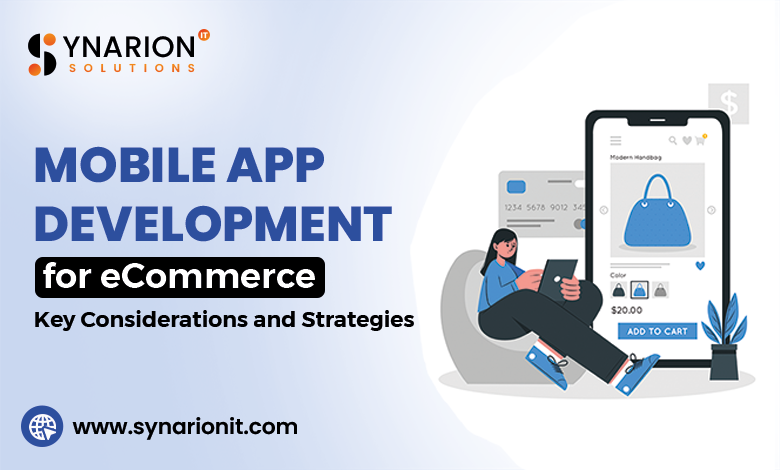In the ever-evolving digital landscape, mobile applications have become a cornerstone of modern eCommerce businesses. With smartphone usage skyrocketing, eCommerce app development has become a key focus for retailers aiming to provide their customers with seamless, on-the-go shopping experiences. As mobile apps continue to shape consumer behavior, understanding the critical considerations and strategies involved in mobile app development is essential for any eCommerce business looking to remain competitive and drive growth.
Understanding the Importance of Mobile App Development in eCommerce
Mobile app development for eCommerce offers a wealth of opportunities for businesses to connect with their customers in ways that are personalized, efficient, and convenient. With more consumers relying on mobile devices for shopping, a dedicated mobile app can elevate a brand’s presence, build customer loyalty, and increase sales. According to studies, mobile commerce (mCommerce) is projected to account for over 70% of global eCommerce sales by 2024. This significant trend underscores the importance of integrating mobile-first strategies in the development of any online store.
A well-designed mobile app provides several advantages over traditional desktop websites. It ensures faster load times, more intuitive navigation, and an optimized experience tailored to the unique needs of mobile users. Additionally, mobile apps can leverage device capabilities like push notifications, location-based services, and camera functions, creating a richer shopping experience that can drive customer engagement.
Key Considerations in eCommerce App Development
User Experience (UX) Design
User experience is one of the most critical factors in the success of an eCommerce mobile app. If users find the app difficult to navigate or slow to load, they will likely abandon their shopping carts or uninstall the app altogether. To ensure a seamless user experience, eCommerce app developers must prioritize intuitive design, clear navigation, and minimal load times.
This involves ensuring that key features like search bars, product categories, checkout flows, and payment integrations are easily accessible and user-friendly. The app must also be optimized for various screen sizes and devices to provide a consistent experience across different platforms.
Performance and Speed
In mobile app development for eCommerce, performance is crucial. Shoppers expect apps to load quickly and run smoothly. According to research, even a one-second delay in page load time can result in a significant decrease in conversions. Therefore, developers must prioritize speed optimization, implementing efficient coding practices and optimizing images and multimedia content for mobile devices.
Moreover, the app’s performance should be robust enough to handle high volumes of traffic, especially during peak shopping times like holidays or flash sales. Implementing caching techniques, content delivery networks (CDNs), and database optimizations can significantly improve app performance.
Security and Privacy
Security is a top priority in eCommerce app development. Mobile apps store sensitive customer data, including payment details, shipping addresses, and personal preferences, making them a target for cybercriminals. To safeguard this information, developers must implement robust security protocols such as encryption, two-factor authentication (2FA), and secure payment gateways.
Furthermore, eCommerce apps must comply with regional privacy laws, such as the GDPR in Europe or CCPA in California, to protect users’ data and ensure legal compliance. Offering transparent privacy policies and giving users control over their data is essential to maintaining trust and credibility.
Payment Gateway Integration
A smooth and secure payment process is vital for eCommerce app development. Offering multiple payment options—such as credit cards, digital wallets (like Apple Pay and Google Pay), and local payment methods—can enhance customer satisfaction and boost conversion rates. Additionally, developers must ensure that the payment gateway integration is secure and complies with industry standards like PCI-DSS.
Strategies for Successful eCommerce App Development
Personalization and Customer Engagement
Personalization plays a crucial role in eCommerce app development. By leveraging customer data, developers can create personalized shopping experiences that cater to individual preferences. This could include personalized product recommendations, targeted promotions, and tailored content that resonates with users.
Incorporating push notifications is another strategy for boosting customer engagement. These notifications can inform users about new arrivals, flash sales, or cart reminders, enticing them to return to the app and complete their purchase.
Omnichannel Experience
An omnichannel strategy involves offering a consistent shopping experience across all touchpoints—whether on mobile apps, websites, or physical stores. For eCommerce businesses, this means ensuring that the mobile app integrates seamlessly with the website and other sales channels. Features like shared shopping carts, synchronized wish lists, and real-time inventory updates can create a unified experience that encourages users to shop across multiple channels.
Analytics and Reporting
In the competitive world of eCommerce, it’s essential to measure and analyze app performance continuously. Developers and business owners should integrate analytics tools that track user behavior, sales data, and engagement metrics. These insights can be invaluable in optimizing the app’s functionality, identifying bottlenecks, and improving user retention strategies.
Future Trends in eCommerce App Development
As the mobile app development landscape continues to evolve, eCommerce businesses must stay ahead of the curve. Some emerging trends to watch for include:
- AI and Machine Learning: AI-powered recommendation engines and chatbots are increasingly being used to enhance the customer experience by offering personalized product suggestions and providing instant customer support.
- Augmented Reality (AR): AR technology allows users to visualize products in their real-world environment, which can be particularly beneficial for industries like fashion and furniture.
- Voice Commerce: With the rise of voice-activated assistants like Amazon Alexa and Google Assistant, integrating voice search and shopping capabilities into mobile apps will become more prevalent.
Conclusion
Mobile app development is an integral part of eCommerce strategy, offering significant opportunities for businesses to enhance customer engagement, increase sales, and streamline operations. By focusing on critical considerations like user experience, performance, security, and personalization, businesses can create a mobile app that not only meets customer expectations but exceeds them. By implementing these strategies and staying on top of industry trends, eCommerce businesses can position themselves for long-term success in the mobile-first future.



